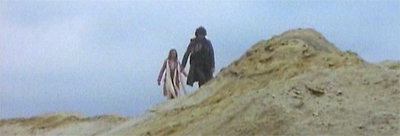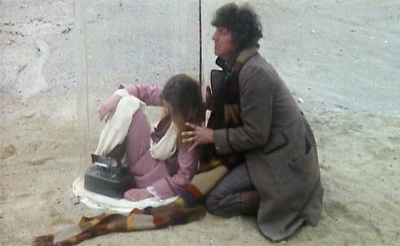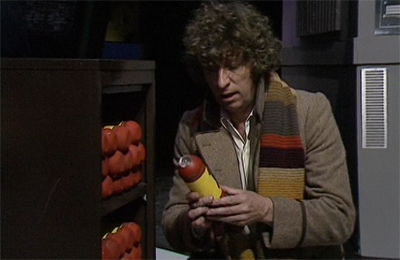To celebrate the fiftieth anniversary of the longest-running science-fiction show in the world, I’ll be taking weekly looks at some of my own personal favourite stories and arcs, from the old and new series, with a view to encapsulating the sublime, the clever and the fiendishly odd of the BBC’s Doctor Who.
The Last of the Time Lords originally aired in 1979.
Oh, look! Rocks!
– the Doctor
Destiny of the Daleks is a bit crap. I know that there’s a whole bunch of “a bit crap” Dalek episodes, but Destiny of the Daleks doesn’t suffer because it doesn’t make sense, or it hangs on plot contrivance. Instead, it’s just a little bit dull. At least Resurrection of the Daleks bangs along making no sense in a reasonably exciting manner. In contrast, Destiny of the Daleks just sort of… is. In a way, it serves as the perfect opener to Graham Williams’ final year as producer, perfectly capturing the gap between the production staff the cast and the writers that so often led to bit of a mismatch in this part of the show’s history.
While I have a fondness for Terry Nation, I think it’s perfectly reasonable to argue that his style was hardly progressive or dynamic when he first wrote for the show in 1963. Indeed, my fondness for his work in the early years of the show is mostly down to how it harks backwards to pulpy classic science-fiction. If Nation wasn’t the most forward-looking of writers in 1963, then perhaps he really wasn’t best suited to open a season for Graham Williams and Douglas Adams in 1979.
Again, I must concede that I’m actually quite fond of both Terry Nation and Graham Williams. In particular, I recognise how Williams found himself in an untenable position. After Mary Whitehouse helped evict Philip Hinchcliffe from the show, Williams found his ability to direct the show somewhat curtailed. He couldn’t do anything too horrific, because that had already generated a scandal. Similarly, he couldn’t do serious science-fiction on the budget afforded him by the BBC. He really didn’t have too many options open to him.
So I completely understand what Douglas Adams and Graham Williams were trying to do with the series. Their time in charge saw a wealth of clever high concepts and a decidedly wacky sense of humour. Far from trying to distract from the relatively crappy production values, Adams and Williams seemed to actively mock them. And I suspect that’s why fans are not so fond of the era. Watching Doctor Who seems to require a massive suspension of disbelief, but fans tend to react rather poorly to the show making fun of itself.
There’s something very touchy about the way that fans react to the conscious injection of humour into the show. After all, a lot of Sylvester McCoy’s early work is dismissed as childish, biding time for the more grown-up stories to follow. The Gunfighters is pretty much loathed, despite being one of the funniest comedies the show has ever done. Of course, part of that is due to the fact that humour is subjective, but I also suspect that Doctor Who fans are also a bit prone to take the show a bit too seriously. Says the guy cranking out 4,000 word essays on the topic.
Of course, there were problems with Williams’ tenure, and it seemed that for a lot of the shows he produced, the production team found themselves at odds with the script. It’s telling that one indisputable classic from this season is the one actually written by script editor Douglas Adams, and that Adams’ own Shada is considered a lost classic – despite the fact that nobody seems too fond of the stories surrounding it. Adams worked very well with the tone of the show that he and Williams were putting together.
Unfortunately, it seems that most of the writers had a bit of difficulty with that tone. In fact, it often feels like the tone is off as we watch these episodes. Indeed, for better or worse, Destiny of the Daleks feels so weird because the production makes a genuine effort to play the Daleks as comedy. That’s something we haven’t seen in a while. However, Nation’s script seems intent that we consider them a serious galactic threat.
So we get strange sequences like the Doctor stealing Davros in a wheelchair and running around the halls swinging a genocidal dictator to a score by Dudley Simpson that can best be described as “whimsical”, while at one point the Doctor himself plays into the famous gag about the Daleks’ one true enemy. Stairs. “If you’re supposed to be the superior race of the universe, why don’t you try climbing after us?” the Doctor taunts, immediately making sure that nobody anywhere will be afraid of a Dalek until they finally overcome that obstacle in Remembrance of the Daleks.
However, all this is juxtaposed against a script that wants to convince us to take the Daleks serious. The stalemate scene, where the Doctor holds Davros hostage while the Daleks execute hostages to force the Doctor’s surrender is a surprisingly unnerving sequence that builds upon a familiar set-piece. Destiny of the Daleks also sees Davros turning his iconic creations into suicide bombers. Given that the use of suicide bombing as a terrorist tactic only really emerged in Lebanon in 1983, it seems like Nation is drawing (as ever) on the Second World War – reinventing the Daleks as kamikazes.
There is some interesting Dalek stuff here, but it gets a bit lost in the focus on Davros and the way the production plays it as comedy. There’s a sense that the Daleks have lost their identity. Indeed, it seems like Terry Nation has written them as robots. Apparently, without anybody noticing, the Dalek casings ejected the Kaled mutants inside and somehow transformed into sentient robots. However, what is really strange is that nobody seems to find that at all odd or jarring.
I’ve argued before that Terry Nation is one fairly significant stumbling block when it comes to trying to create a Doctor Who continuity. In fact, his Daleks seem to reject the notion of some logical continuity. In The Daleks, they were post-atomic mutants hiding in the ruins of their world. In The Dalek Invasion of Earth, it turns out they had a secret interstellar empire. In The Chase, suddenly they don’t need discs to move and can travel in time.
Trying to make sense of Dalek history is a headache waiting to happen, and it’s one of the reasons I consider the show to have a somewhat elastic sense of continuity even before Russell T. Davies and Steven Moffat invented plot-related justifications for that hazy sense that the show didn’t really always fit together especially well. That’s why I don’t mind the introductory scene with Romana that much. Given that The Deadly Assassin made such a big deal of regeneration, casually “trying” new bodies and regenerating for no reason seems a little surreal. However, the show needed to change actresses, and it seemed a logical way.
Indeed, you could make a number of arguments. You could suggest that it ties into Planet of the Spiders; you could argue that it’s just more proof that the Doctor is a bit crap at regenerating (also implied by the Master’s control of his regeneration in Utopia); or you could even make that it’s an attempt to retroactively “soften” the harshness of the process as articulated in The Deadly Assassin (as Russell T. Davies has also tried to do, subtly, throughout his tenure).
However, it ultimately came down to the fact that the show needed a new lead actress and that this seemed the best way to do it. As Terry Nation explained, trying to fit it all together couldn’t have been further from their minds:
It was a fairly boring thing to have this regeneration of Romana in Destiny of the Daleks, and I thought it would be funny if we could say ‘No, I don’t like that body; I’d like a different nose’, so it was done for a moment of comedy and light relief. Nobody at that point believed that years later, the show would be examined with such microscopic intent. While it may be an issue for some of the fans, I can tell you that it was just saying ‘That’s a funny bit – let’s do it.’
So, in keeping with this elastic continuity, the Daleks are suddenly robots. Because, why not? Well, actually, there’s a lot of reasons why not. After all, the Daleks we love weren’t conceived as robots functioning on logic. They were hideous monsters powered by hatred.
Of course, Nation created the Daleks. He’s entitled to write anything he wants about them, just as anybody is entitled to write or think anything they want about anything. (Try to publish it, though, and you open a can of worms.) That doesn’t mean that Nation is always right. I’ll argue that Nation is a much better writer than people give him credit for. I think that his grasp of iconography is better than none. However, it seems that sometimes he doesn’t quite get nuts-and-bolts story mechanics. I think that he created on of the greatest pop culture monsters ever, but that doesn’t mean he knows how to make them work best.
That said, I’m just a guy on the internet. What do I know? It just seems like Destiny of the Daleks robs the Daleks of their identity. And that, perhaps, is the episode’s most interesting concept. It almost seems accidental. While you could argue that Davros might have been created as a one-shot character in Genesis of the Daleks, it is Destiny of the Daleks when he comes to completely define his creation. Barring specials and cameos, there wouldn’t be another televised Dalek story without Davros until 2005.
So it does seem like the Daleks are losing their identity. Suddenly they aren’t mutants, but they are robots. Suddenly they aren’t the true villains of the show, they are flunkies to Davros. Indeed, they are so desperately lost that they can’t even stand up to Davros’ command. When the Doctor threatens to kill himself and Davros, the Daleks cannot comprehend. “Self-sacrifice illogical,” they state, “therefore impossible.” This is a very Dalek way of thinking – survival as the ultimate imperative. So it’s no small irony that they lose sight of even that at the climax of Destiny of the Daleks, when Davros wraps them in suicide vests and sends them out to die.
Indeed, in Fiona Moore and Alan Steven’s exploration of the serial, they suggest that Davros’ resurrection mirrors Arthurian legends about how King Arthur would return to his people in the time of their greatest need. The Daleks aren’t just losing their own identity, they’re actually stealing from another distinctly human culture. Davros himself cloaks his survival in almost religious terms. “The resurrection has come,” he tells the Doctor, “as I always knew it would.” After all, it isn’t just Arthur who promised to return to his followers.
Maybe Russell T. Davies was building on this when he introduced the concept of religion to the Daleks in The Parting of the Ways. Indeed, the very act of searching out Davros after exterminating him in the first place suggests that the Daleks are going through some form of existential crisis. “The Daleks just changed their minds,” the Tenth Doctor would remark in Evolution of the Daleks. “Daleks never change their minds.”
We can see from Destiny of the Daleks that the Daleks themselves are in a state of decay or decline. It’s not related to the collapse of a space empire or an on-going war, this is more of an existential crisis. These Daleks have something approach doubt, and something approaching faith. It radically alters the Daleks as characters, something that Davies would really hone in during the revival. He handled it well in The Parting of the Ways, but the show faltered with Daleks in Manhattan.
I like Davros as a character. I think he works well as a foil for the Doctor. However, I think that he and the Daleks work best separately. Of course, his quality depends a lot on the actor playing the role. David Gooderson is easily the weakest Davros ever to appear in the series, and the episode suffers for reducing him to a ranting megalomaniac. He had also been a ranting megalomaniac in Genesis of the Daleks, but he was a far more complex character as well.
In Destiny of the Daleks, Davros seems to have forgotten how to scheme and plot, and instead just shouts and rambles a lot. The later stories would do a bit better with Davros as a manipulative schemer, but Destiny of the Daleks suffers a bit for that. If you are going to bring back a character who worked so well in his first appearance, his next appearance should at least make good use of him. Here, Davros works better as an idea than as a character. That’s not a fatal flaw, but it causes problems when the character hangs around for the last two episodes.
To be fair to Nation as a writer, at least Destiny of the Daleks tries to play with some of his conventions. The Daleks featured the eponymous monsters in competition with the Thals. The Thals were a typical sixties subculture, beautiful young pacifists living free. Of course, there were also some uncomfortable racial connotations to the way that they were cast. Destiny of the Daleks turns this on its head.
We really don’t need the Movellans cluttering up the plot, but at least they play with Nation’s style a bit. If the Thals embodied the youth of the sixties, the Movellans so perfectly capture the seventies that I’m tempted to describe them as “disco bots.” They’re also pleasingly ethnically diverse. Indeed, Nation subverts the idea that “beauty equals goodness” as demonstrated by the Thals. These beautiful people might look pretty, but they’re also completely amoral.
Still, a Terry Nation script is a Terry Nation script. So, for example, the Daleks are revealed at the climax of the first episode. Just to be clear, that’s the last few seconds of Destiny of the Daleks, Part I. It’s not really a cliffhanger if the title clues you into the fact that the Daleks are hanging around. And yet the plot treats the fact that the Doctor is on Skaro as a twist, and the Dalek ambush of Romana as a complete surprise. At least the first episode of Invasion of the Dinosaurs had the decency to go by the title “Invasion” so as not to ruin the twist. Instead, Destiny of the Daleks trumpeted the monsters’ return with specially-shot promos.
There’s also the fact that Nation’s logic about two computers at stalemate seems a bit spurious. After all, the whole “rock-paper-scissors” bit demonstrates that the Movellans don’t actually follow logic. They simply repeat patterns. The Doctor defeats them at rock-paper-scissors using a familiar pattern that is easy to recognise. Quite simply, they move to counter his last move, so he can counter their next. Even a computer should be able to figure that pattern out. The fundamental idea – to races of robots fighting to a logical stalemate – is sound, but the explanation is nonsense.
But all of this ignores the fact that Destiny of the Daleks is just not very good. It features a lot of padding and a lot of escaping, and a lot of running around. The narrative is cluttered with a whole host of elements that distract from what should be a pretty compelling reunion between the Doctor, Davros and the Daleks. There are some interesting ideas, but the execution is lackluster. Nation’s plotting seems to be running on auto-pilot in such a way that it detracts from the otherwise good ideas. The production plays the script for laughs when Nation seems to be taking it relatively seriously.
Still, there is one thing to be said for it all. It does give us the team of the Fourth Doctor and Romana II, which may be my favourite TARDIS team of all time. The only real competition comes from the Tenth Doctor and Donna, the Ninth Doctor and Rose, any Doctor and Sarah Jane and the Third Doctor and Liz and the Brigadier. What’s really remarkable about the Fourth Doctor and Romana II is that they really don’t have an especially strong run of stories – it’s literally just the way that Baker and Ward play off one another. My affection for the Williams’ era is down to the way that they work so well together.
Still, Destiny of the Daleks is a bit of a miss. Still, at least it means that the pepperpots would get better from here on out.
Filed under: Television | Tagged: Alan Stevens, arts, bbc, Dalek, Dalek Invasion of Earth, Davros, Deadly Assassin, doctor, DoctorWho, Douglas Adams, Dudley Simpson, Graham Williams, Romana, russell t. davies, science fiction, Skaro, Sylvester McCoy, tardis, Terry Nation, Thals, Time Lord, Unearthly Child |


































Tom and Lalla almost redeem this one with instant chemistry (put to much better purpose in “City of Death”) but it is certainly a low point for me. The trope of “logic bad / emotion good” was scarcely original even at the time, though that would have been excusable had they done it well (which they didn’t). In hindsight, I also find some aspects of it pretty distasteful: did the Doctor just strip the top off a woman who only just saved his life, albeit not altruistically? Mary Whitehouse must have been distracted that day …
Yeah, it’s not a good one.
It’s a shame, as I do love the Doctor/Romana pairing. It’s a shame that they were so poorly served.